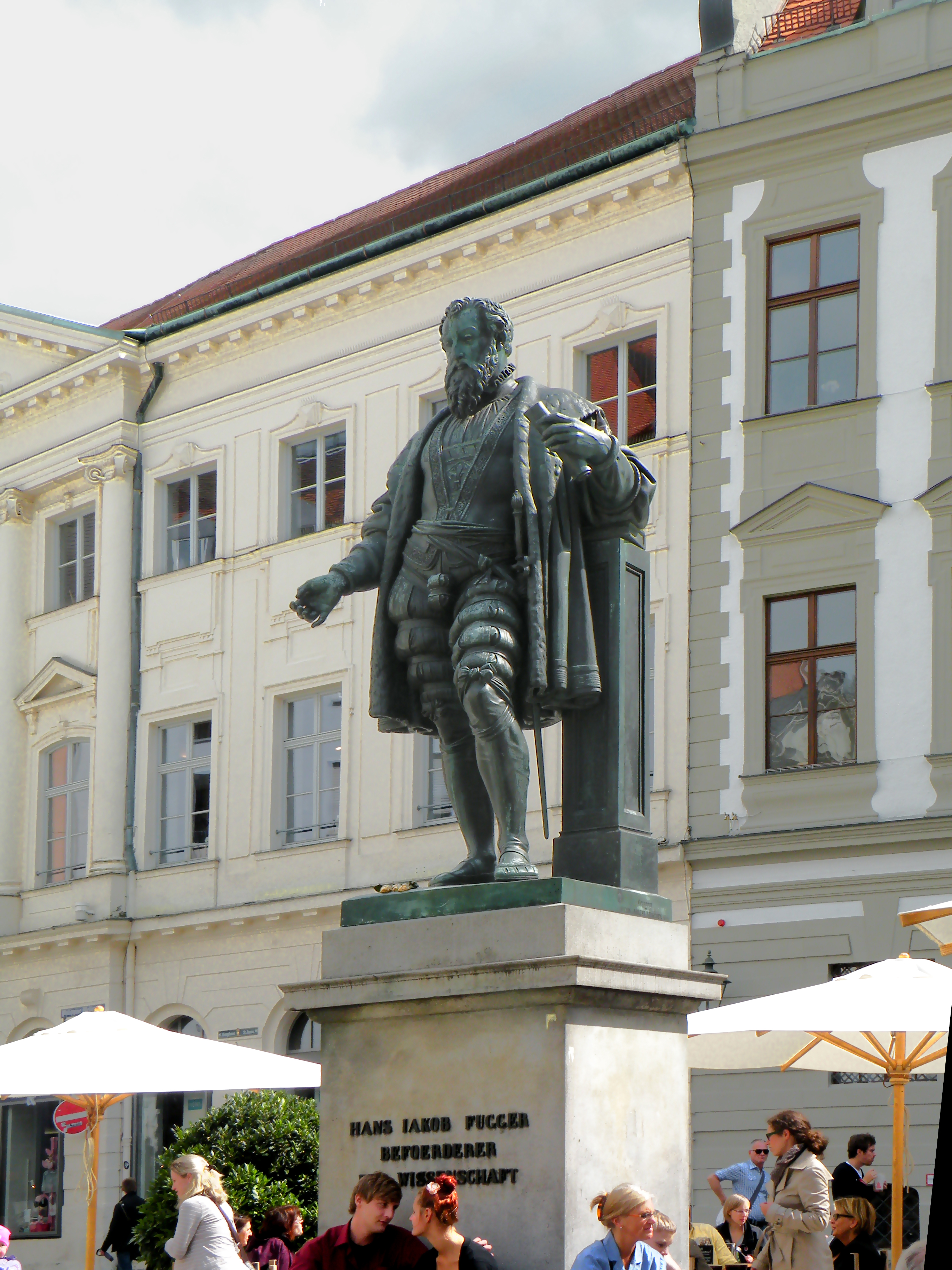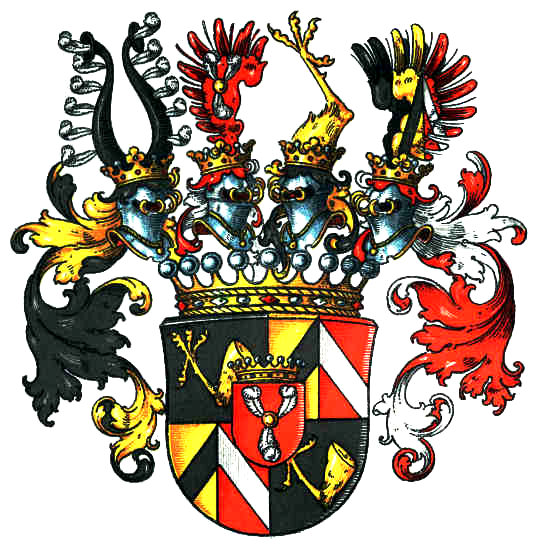|
Sigmund Fugger Von Kirchberg Und Weißenhorn
Sigmund Friedrich Fugger von Kirchberg und Weißenhorn (1542 - 15 November 1600) was a German cleric of the Fugger family, most notable as bishop of Regensburg from 2 July 1598 to 1600. Life A son of the businessman and humanist Hans Jakob Fugger (born 23 December 1516) and his wife Ursula von Harrach (1522–1554), Sigmund's brothers included religious dignitaries, along with Karl and Ferdinand (who were colonels in the Spanish army) and Maximilian (a Komtur in the German orders of chivalry). He became bishop of Regensburg in 1598, taking on the bishopric when it was plagued by war, debt and bad harvests. He tried to continue the reforming work of Jakob Miller, who had from 1587 to 1597 reformed the bishopric for the bishop and cardinal Philip Wilhelm. In accordance with the Council of Trent's demands for reform, Sigmund urged the laity in his diocese to go frequently to confession, rigorously enforced priestly celibacy and monitored religious education in the diocese's parishe ... [...More Info...] [...Related Items...] OR: [Wikipedia] [Google] [Baidu] |
Fugger
The House of Fugger () is a German upper bourgeois family that was historically a prominent group of European bankers, members of the fifteenth- and sixteenth-century mercantile patriciate of Augsburg, international mercantile bankers, and venture capitalists. Alongside the Welser family, the Fugger family controlled much of the European economy in the sixteenth century and accumulated enormous wealth. The Fuggers held a near monopoly on the European copper market. This banking family replaced the Medici family, who influenced all of Europe during the Renaissance. The Fuggers took over many of the Medicis' assets and their political power and influence. They were closely affiliated with the House of Habsburg whose rise to world power they financed. Unlike the citizenry of their hometown and most other trading patricians of German free imperial cities, such as the Tuchers, they never converted to Lutheranism, as presented in the Augsburg Confession, but rather remained with the ... [...More Info...] [...Related Items...] OR: [Wikipedia] [Google] [Baidu] |
Bishop Of Regensburg
The Bishops of Regensburg (Ratisbon) are bishops of the Roman Catholic Diocese of Regensburg, Bavaria, Germany."Diocese of Regensburg" ''''. David M. Cheney. Retrieved February 29, 2016"Diocese of Regensburg" ''GCatholic.org''. Gabriel Chow. Retrieved February 29, 2016 The seat of the bishops is . History Th ...[...More Info...] [...Related Items...] OR: [Wikipedia] [Google] [Baidu] |
Johann Jakob Fugger
Johann Jakob Fugger or Hans Jakob Fugger (23 December 1516, Augsburg - 14 July 1575, Munich) was a German banker and patron of the arts and sciences from the ''von der Lilie'' (''of the Lily'') line of the noted Fugger banking family. Life He was the son of Raymund Fugger (1489–1535) and his wife Katharina (1488–1535), daughter of János Thurzó, owner of a mining company. Johann Jakob inherited the business from his father's brother Anton Fugger in 1560 but did not prove so fortunate in his business dealings - the family had lent money to Charles V, Holy Roman Emperor, landing them in deep trouble when Spain went bankrupt. Johann Jakob had to sell off his whole collection (except his library) to improve matters and handed the business over to his cousin Marcus (1529–1597), who was able to consolidate it. In 1565 he entered Albert V's service and later became president of his privy chamber. On Titian's advice, Johann Jakob brought Titian's pupil Antonio Ponzano to Augsbu ... [...More Info...] [...Related Items...] OR: [Wikipedia] [Google] [Baidu] |
Harrach
The House of Harrach is an old and influential Bohemian and Austro-German noble family. The ''Grafen'' (Counts) of Harrach were among the most prominent families in the Habsburg Empire. As one of few mediatized families, it belongs to high nobility. History The family first appeared in 1195 in the documents found in Ranshofen Abbey, Duchy of Bavaria. There are two main family branches — Rohrau branch in Austria (until 1886) and Jilemnice branch in Bohemia. They were formed from two sons of Count Karl von Harrach (1570–1628). Two branches were later founded by grandsons of Friedrich August von Harrach-Rohrau — Ernest Christopher Joseph (d. 1838) and Ferdinand Joseph (d. 1841). * 1195 — first mentions of the family in Ranshofen monastery. * 14th century — owned lands in Austria, Carinthia and Styria. * 1524 — Leonhard III von Harrach acquired Rohrau Castle. * 4 January 1552 — Leonhard IV von Harrach (d. 1590) received the title of Imperial Baron from Charles V, Hol ... [...More Info...] [...Related Items...] OR: [Wikipedia] [Google] [Baidu] |
Komtur
Commander ( it, Commendatore; french: Commandeur; german: Komtur; es, Comendador; pt, Comendador), or Knight Commander, is a title of honor prevalent in chivalric orders and fraternal orders. The title of Commander occurred in the medieval military orders, such as the Knights Hospitaller, for a member senior to a Knight. Variations include Knight Commander, notably in English, sometimes used to denote an even higher rank than Commander. In some orders of chivalry, Commander ranks above (i.e. Officer), but below one or more ranks with a prefix meaning 'Great', e.g. in French, in German, (using an equivalent suffix) in Spanish, in Italian, and in Dutch (, 'Grand Commander'), Grand Cross. France History The rank of in the French orders comes from the Middle Ages military orders, in which low-level administrative houses were called and were governed by . In the Modern Age, the French Kings created chivalric orders which mimicked the military order's ranks. * The Order of ... [...More Info...] [...Related Items...] OR: [Wikipedia] [Google] [Baidu] |
Jakob Miller
Jakob Miller (also spelled ''Jacob Myller'' or ''Müller''; 1550 - 11 December 1597) was a Catholic reformist theologian, provost and administrator of the diocese of Regensburg. Life Miller was born in Kißlegg, Allgäu. He studied at the Germanicum in Rome and in 1578 was made a cathedral-preacher in Konstanz, then on his deposition from that post in 1585 as visitor to the bishopric of Konstanz. From 1586 he was spiritual overseer of the diocese of Regensburg. In Regensburg Miller tried to set up a Jesuit college, wrote new diocesan constitutions and enforced the decisions of the Council of Trent in the diocese. In 1592 he was made the first mitred provost of Regensburg, since the bishop Philipp of Bavaria Philipp Wilhelm of Bavaria (22 September 1576, Munich – 18 May 1598, Dachau) was a German cardinal. Life The son of William V, Duke of Bavaria and Renata of Lorraine, he studied theology and philosophy at Ingolstadt University with his younger ... was still in his minori ... [...More Info...] [...Related Items...] OR: [Wikipedia] [Google] [Baidu] |
Philip Wilhelm Von Bayern
Philipp Wilhelm of Bavaria (22 September 1576, Munich – 18 May 1598, Dachau) was a German cardinal. Life The son of William V, Duke of Bavaria and Renata of Lorraine, he studied theology and philosophy at Ingolstadt University with his younger brother Ferdinand (later archbishop of Cologne). He was given the honorary posts of canon of Cologne, Mainz, Salzburg and Trier, having already been made prince bishop of Regensburg aged three. His father hoped Philipp's election as bishop would bind the diocese more strongly to the duchy of Bavaria and defend against the Protestant forces in the city of Regensburg. During his minority Philipp was represented by Felizian Ninguarda. In 1582, he gave up his post to the Bohemian Baron Zbinko Berka. In 1586, Zbinko and Philipp's father came into tension and so Zbinko handed over the diocese's administration to Jakob Miller in 1586. Philipp was made a cardinal by pope Clement VIII in the consistory of 18 December 1596, but he died in a riding ... [...More Info...] [...Related Items...] OR: [Wikipedia] [Google] [Baidu] |
Council Of Trent
The Council of Trent ( la, Concilium Tridentinum), held between 1545 and 1563 in Trento, Trent (or Trento), now in northern Italian Peninsula, Italy, was the 19th ecumenical council of the Catholic Church. Prompted by the Protestant Reformation, it has been described as the embodiment of the Counter-Reformation."Trent, Council of" in Cross, F. L. (ed.) ''The Oxford Dictionary of the Christian Church'', Oxford University Press, 2005 (). The Council issued condemnations of what it defined to be Heresy, heresies committed by proponents of Protestantism, and also issued key statements and clarifications of the Church's doctrine and teachings, including scripture, the biblical canon, sacred tradition, original sin, Justification (theology), justification, salvation, the Sacraments of the Catholic Church, sacraments, the Mass (liturgy), Mass, and the Veneration, veneration of saints.Wetterau, Bruce. ''World History''. New York: Henry Holt and Company, 1994. The Council met for twenty- ... [...More Info...] [...Related Items...] OR: [Wikipedia] [Google] [Baidu] |
1542 Births
Year 154 ( CLIV) was a common year starting on Monday (link will display the full calendar) of the Julian calendar. At the time, it was known as the Year of the Consulship of Aurelius and Lateranus (or, less frequently, year 907 ''Ab urbe condita''). The denomination 154 for this year has been used since the early medieval period, when the Anno Domini calendar era became the prevalent method in Europe for naming years. Events By place Roman Empire * King Eupator of Bosphorus pays tribute to Rome, due to the threat posed by the Alani. * The Antonine Wall is completed. Asia * Last (2nd) year of ''Yongxing'' era of the Chinese Han Dynasty. * Adalla becomes ruler of the Korean kingdom of Silla. By topic Religion * Anicetus becomes pope of Rome (approximate date). * Anicetus meets with Polycarp of Smyrna to discuss the Computus, the date of Easter in the Christian liturgical calendar. * Change of Patriarch of Constantinople from Patriarch Euzois to Patriarch La ... [...More Info...] [...Related Items...] OR: [Wikipedia] [Google] [Baidu] |
1600 Deaths
Sixteen or 16 may refer to: *16 (number), the natural number following 15 and preceding 17 *one of the years 16 BC, AD 16, 1916, 2016 Films * '' Pathinaaru'' or ''Sixteen'', a 2010 Tamil film * ''Sixteen'' (1943 film), a 1943 Argentine film directed by Carlos Hugo Christensen * ''Sixteen'' (2013 Indian film), a 2013 Hindi film * ''Sixteen'' (2013 British film), a 2013 British film by director Rob Brown Music *The Sixteen, an English choir * 16 (band), a sludge metal band * Sixteen (Polish band), a Polish band Albums * ''16'' (Robin album), a 2014 album by Robin * 16 (Madhouse album), a 1987 album by Madhouse * ''Sixteen'' (album), a 1983 album by Stacy Lattisaw *''Sixteen'' , a 2005 album by Shook Ones * ''16'', a 2020 album by Wejdene Songs * "16" (Sneaky Sound System song), 2009 * "Sixteen" (Thomas Rhett song), 2017 * "Sixteen" (Ellie Goulding song), 2019 *"16", by Craig David from ''Following My Intuition'', 2016 *"16", by Green Day from ''39/Smooth'', 1990 *"16", b ... [...More Info...] [...Related Items...] OR: [Wikipedia] [Google] [Baidu] |
Fugger Family
The House of Fugger () is a German upper bourgeois family that was historically a prominent group of European bankers, members of the fifteenth- and sixteenth-century mercantile patriciate of Augsburg, international mercantile bankers, and venture capitalists. Alongside the Welser family, the Fugger family controlled much of the European economy in the sixteenth century and accumulated enormous wealth. The Fuggers held a near monopoly on the European copper market. This banking family replaced the Medici family, who influenced all of Europe during the Renaissance. The Fuggers took over many of the Medicis' assets and their political power and influence. They were closely affiliated with the House of Habsburg whose rise to world power they financed. Unlike the citizenry of their hometown and most other trading patricians of German free imperial cities, such as the Tuchers, they never converted to Lutheranism, as presented in the Augsburg Confession, but rather remained with th ... [...More Info...] [...Related Items...] OR: [Wikipedia] [Google] [Baidu] |



